De Nederlandse dichter, schrijver en zanger Willem Andries Wilmink werd geboren in Enschede op 25 oktober 1936. Zie ook mijn blog van 25 oktober 2010 en eveneens ook alle tags voor Willem Wilmink op dit blog.
Zomeravond
(Naar het Portugees)
Kindje, slaap maar, kindje,
’t was ook zo warm deze dag.
In de schemer
zit nu een kleine egel
met zijn mooie stekels
eenzaam in het gras.
Het gras wacht op regen.
Geen takje beweegt er.
Luister naar de merel,
hoog op ons dak.
Avond vol verlangen.
De maan maakt zich klaar voor de nacht.
In de avondschemer
komt strakjes onze egel
nog een egel tegen,
liefkoost haar vacht.
Van ver wordt de merel
antwoord gegeven.
Morgen komt de regen
waar het gras op wacht.
Kindje, slaap maar, kindje,
in de avondschemer.
Hebt al slaap gekregen.
Slaap maar mijn schat.
Uitreiking van diploma’s
Onder de meisjes menig stevig stuk,
maar er zijn ook van die nog hele tere,
onder de jongens veel in herenkleren,
en allen, allen stralend van geluk.
Niet langer meer gebukt onder het juk
van heel veel saais om uit het hoofd te leren:
niemand zal ooit nog bij hen informeren
naar passé défini of overdruk.
Maar ’t is meteen ook de examenklas,
die vol saamhorigheid en warmte was,
waarvan men zich zo zorgeloos ontdoet.
Nu slaat voor ’t laatst de grote schooldeur dicht,
en kijk, daar gaan ze: blij en doelgericht
een toekomst met veel heimwee tegemoet.
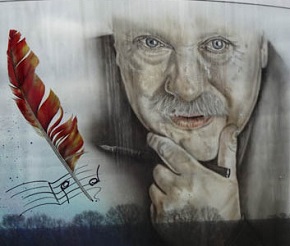
Willem Wilmink (25 oktober 1936 – 2 augustus 2003)
Portret door Desirée Groot Koerkamp in Oostmarsum
De Amerikaanse schrijfster Anne Tyler werd geboren op 25 oktober 1941 in Minneapolis, Minnesota. Zie ook mijn blog van 25 oktober 2010 en eveneens alle tags voor Anne Tyler op dit blog.
Uit: A Spool of Blue Thread
“It took a total of five vehicles to carry them all to the beach. They could have managed with fewer, but Red insisted, as usual, on driving his pickup. How else could they bring everything they needed, he always asked—the rafts and boogie boards, the sand toys for the children, the kites and the paddle-ball racquets and the giant canvas shade canopy with its collapsible metal frame? (In the old days, before computers, he used to include the entire Encyclopaedia Britannica.) So he and Abby made the three-hour trip in the pickup, while Denny drove Abby’s car with Susan in the passenger seat and the food hampers in the rear. Stem and Nora and the three little boys came in Nora’s car, and Jeannie and Jeannie’s Hugh started out separately from their own house with their two children, though not with Hugh’s mother, who always spent the beach week visiting Hugh’s sister in California.
Amanda and Amanda’s Hugh and Elise traveled on a whole different day—Saturday morning instead of Friday afternoon, since Amanda always had trouble getting away from her law office—and they stayed in a different cottage, because Amanda’s Hugh couldn’t tolerate what he called the hurly-burly.
None of the dogs came. They were all boarding at Penpals.
The house the Whitshanks rented every summer stood right on the beach—a comparatively uncrowded stretch of the Delaware coast—but it wasn’t what you’d call luxurious. The walls were tongue-and-groove, painted a depressing pea-soup green; the floor- boards were so splintery no one dared go barefoot; the kitchen dated from the 1940s. But it was big enough for all of them, and far homier than the glittering new mansions with giant Palladian windows that had popped up elsewhere along the shore. Besides, Red could always use a few fix-it jobs to keep him occupied. (He wasn’t a natural vacationer.) Even before Abby and Nora had unpacked the food, he had happily catalogued half a dozen minor household emergencies. “Will you look at this outlet!” he said. “Practically dangling by a thread!” And off he went to the truck for his tools, with Jeannie’s Hugh not far behind.
“The next-door people are back,” Jeannie called, stepping in from the screen porch.
Next door was almost the only house as unassuming as theirs was, and the people she was referring to had been renting it for at least as long as the Whitshanks had been renting theirs. Oddly enough, though, the two families never socialized.”
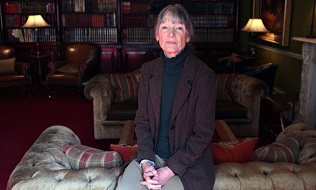
Anne Tyler (Minneapolis, 25 oktober 1941)
De Turkse schrijfster Elif Shafak (eigenlijk Elif Şafak) werd geboren in Straatsburg op 25 oktober 1971. Zie ook alle tags voor Elif Shafak op dit blog.
Uit: The Bastard of Istanbul
“At the moment, however, it was still pouring and Zeliha had little, if any, forgiveness in her heart. She did not have an umbrella, for she had promised herself that if she was enough of an imbecile to throw a bunch of money to yet another street vendor for yet another umbrella, only to forget it here and there as soon as the sun came back, then she deserved to be soaked to the bone. Besides, it was too late now anyway. She was already sopping wet. That was the one thing about the rain that likened it to sorrow: You did your best to remain untouched, safe and dry, but if and when you failed, there came a point in which you started seeing the problem less in terms of drops than as an incessant gush, and thereby you decide you might as well get drenched.
Rain dripped from her dark curls onto her broad shoulders. Like all the women in the Kazancı family, Zeliha had been born with frizzy raven-black hair, but unlike the others, she liked to keep it that way. From time to time her eyes of jade green, normally wide open, and filled with fiery intelligence, squinted into two lines of untainted indifference inherent only to three groups of people: the hopelessly naïve, the hopelessly withdrawn, and the hopelessly full of hope. She being none of these, it was hard to make sense of this indifference, even if it was such a flickering one. One minute it was here, canopying her soul to drugged insensibility, the next minute it was gone, leaving her alone in her body.”

Elif Shafak (Straatsburg, 25 oktober 1971)
De Amerikaanse dichter, schrijver en biograaf Daniel Mark Epstein werd geboren op 25 oktober 1948 in Washington, D.C. Zie ook alle tags voor Daniel Mark Epstein op dit blog.
The Comb-Bearers
Some windless nights on Narragansett Bay,
The deep inlet seems a meadow of fireflies
As multitudes of the luminous jellyfish
Called “comb-bearers” float to the surface
For no evident purpose
But to amaze the fishermen and scientists
Who know them only slightly, each one no more
Than a pear-shaped living sack of liquid
With skin thinner than cellophane, a sheer piece
Of moonlight on the sea, so fragile
The least ripple may tear it
To bits. Calm evenings, the amber-green species
May spread out over a thousand yards square,
An island made of bright individuals
Who usually live in the depths, a zone where
Wave movement ceases. Only on nights
Like these do the comb-bearers
Rise, when the bay lies still as a sheet of slate.
Loveliest of sea beings, the color
Of wild geranium, rose-pink, or beach pea,
As some pass beneath the surface of the water
The effect is of rainbow glory
More seductive than moonlight
To the naturalist who might try to scoop one up
Ever-so-gently in his fine net and
Hold it awhile in a clear beaker of brine-
Perhaps the giant of the race, “Venus’s girdle,”
Come from the Mediterranean-
An iridescent ribbon
Which vanishes en route to the laboratory.
Hope
In winter the crescent moon vanishes
So quickly in the blue, down the horizon,
Between the starry darkness and morning,
Like the hull of a ship without rigging
That I was meaning to load with wishes,
O not for me, my dear, wishes for you,
And you and you, my friends, all of us,
Such cargo as could only ride upon
The silver shell of that hallowed galleon.
I daydreamed, got bewildered by my muse,
Sun on the lace of frost, and fading Venus.
I looked up, and the reckless moon had gone.
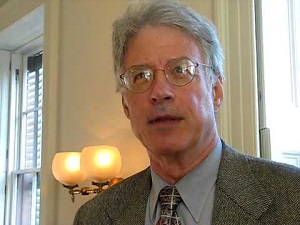
Daniel Mark Epstein (Washington, 25 oktober 1948)
De Duitse dichter en schrijver Peter Rühmkorf werd geboren op 25 oktober 1929 in Dortmund. Zie ook alle tags voor Peter Rühmkorf op dit blog.
Aufbruch vor Morgen
Wieviel Uhr? Es kommen auf einmal so viele
fipsige Vögel auf, verflucht!
Bald wird mir die Sonne ihr Zitronenlicht
ins verkniffene Auge träufeln. . .
Und keine Lehre wird mal daraus-nachhaus
und kein Gedanke an
Bewegung / Besserung.
Aufwachen? – Wozu?
Es ist doch so, laut EMNID folgt für 44%
aller Bundesbürger auf den Tod das Nichts.
Von denen völlig zu schweigen, für die nach dem Nichts
gleich der Tod kommt –
Hab leider vergessen, was ich damit eigentlich
aussagen wollte, achja:
Wer das kapiert hat,
den versteht bald keiner mehr.
Im Verhältnis kannst du natürlich nicht klagen
(das nebenbei) –
Man soll aber auch nicht glauben, hier läg noch derselbe rum
wie damals im letzten Jahr.
Oder wüßtest du grad ne Idee, für die du bedenkenlos
deinen Kopf hinhalten würdenst?
Na-bong, ein Präser hängt sich aus. . .
Das muß aber ja nicht gleich Zustand werden.
Wie ich immer gesagt hab, in solcher Verfassung soll man
eigentlich keine Gedichte schreiben.
Da muß der Kunde doch unvermittelt denken,
hier wär der Ausguck verstopft,
beziehungsweise gar kein Leben mehr
in dieser Rolle –
S o i s t e s a b e r n i c h t!
Der Tag lehnt in der Drehtür:
Wo es meine Lieblingsbouletten gibt, ist noch erleuchtet,
mein Fuß schon unterwegs. . .
Gleich wird – dein Telefon – im Schlaf – aufschrein!
und dir den Aufbruch meiner Leiche
feierlich eröffnen: – : – : –
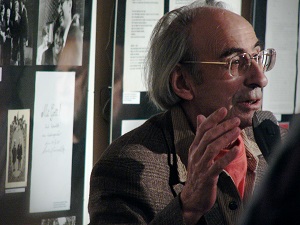
Peter Rühmkorf (25 oktober 1929 – 8 juni 2008)
De Duitse schrijver en arts Jakob Hein werd geboren op 25 oktober 1971 in Leipzig. Zie ook alle tags voor Jakob Hein op dit blog.
Uit: Liebe ist ein hormonell bedingter Zustand
„Die erste Zeile war immer gleich. sie lautete: »Jimmy Clitschi, der Mann ohne Knochen-« Auch die zweite Zeile kannte nur minimale Abweichungen. Es variierten lediglich die Tätigkeit und derKörperteil den sich Jimmy angeblich gebrochen hatte. Ein typisches Beispiel:
Jimmy Glitschi, der Mann ohne Knochen, hat sich beim Furzen den Hintern gebrochen.«
Trotz der stets tragisch endenden Geschichten entbehrten die Gedichte über Jimmy Clitschi nicht einer gewissen Komik. die sich vor allem Menschen unter acht Jahren erschloss.
In meinen ersten Sommerferien verschifften mich meine Eltern ins Ferienlager. In einem Brief, den ich ihnen am zweiten Tag schickte, schrieb ich über das Ferienlager: »Alles Scheißdreck«, mein Befinden beschrieb ich mit den Worten: »Es geht mir scheiße.« Dann kam die erste Diskothek meines Lebens. Der dicke Harald hatte seinen Koffer mit Tonbandkassetten in den Esssaal getragen und zwei Kassettenrekorder mit den Lautsprechern auf volle Lautstärlke gedreht. Da brach es aus mir heraus: Ich bewegte meine Gliedmaßen im Takt der Musik. allerdings jeden meiner Arme. jedes Bein in seinem eigenen Rhythmus, die Augen hinter den Brillengläsern fest geschlossen und den Mund leicht geöffnet. Für einen Aufsenstehenden mag es vielleicht so ausgesehen haben, als hätte ich gerade einen KrampfanfalL aber ich tanzte den Jimmy Glitschi. All mein Heimweh und meine Wut ließ ich aus mir heraus und identifizierte mich in meinem Tanz mit dem berühmten Helden, der sich der Legende nach beim Beischlaf sein Geschlechtsteil gebrochen haben sollte.
Ich sah bestimmt schrecklich aus, ich sah bestimmt lächerlich aus, ich sah erbärmlich aus, aber ich fühlte mich groißartig denn an diesem Nachmittag, hinter den geschlossenen Gardinen des Gemeinschattsraums, entdeckte ich die Kraft des Tanzes, wie Musik die Seele dazu bringen kann, in direkte Verbindung Zum Körper zu treten, um durch Bewegungen Dinge auszudrücken, die der Mund nicht sagen kann.
Danach wurde alles besser.
Als meine Eltern, aufgeschreckt durch meinen Brief, drei Tage später vor dem Ferienlager standen, um mich vorzeitig abzuholen, schaute ich sie nur verständnislos an.“
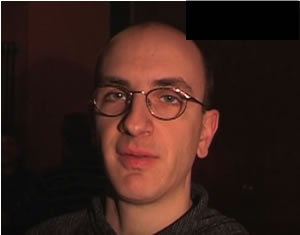
Jakob Hein (Leipzig, 25 oktober 1971)
Zie voor nog meer schrijvers van de 25e oktober ook mijn vorige blog van vandaag.
